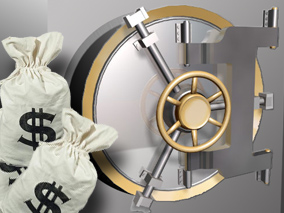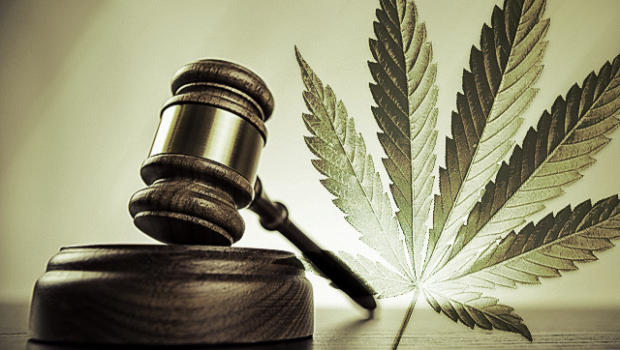 Anne Arundel County Police reported that four people have been arrested in an attempted copper heist in Odenton. Cops were called at around midnight when an assisted living home employee noticed two men running across the home’s property carrying cable. Police arrived as the getaway car was leaving the scene, and were able to stop the car and apprehend the two men. Cops also found another man and a woman in the car. All four thieves, who range in age from 24 to 32, were arrested after 250 feet of copper cable along with tree trimmers were found in their possession. Each member of the group has been charged with malicious destruction of property and theft. One of the crew was also charged with making a false statement to a police officer and using a fake identification to avoid prosecution. This same individual was also arrested on a probation violation. This incident was more than just a run of the mill theft gone wrong. As a direct result of the crew’s actions more than 1,700 residents temporarily lost electricity. The thieves did not actually cut through live wires, but the wires they did cut fell onto live wires, which were severed. BGE was able to restore power that same night.
Anne Arundel County Police reported that four people have been arrested in an attempted copper heist in Odenton. Cops were called at around midnight when an assisted living home employee noticed two men running across the home’s property carrying cable. Police arrived as the getaway car was leaving the scene, and were able to stop the car and apprehend the two men. Cops also found another man and a woman in the car. All four thieves, who range in age from 24 to 32, were arrested after 250 feet of copper cable along with tree trimmers were found in their possession. Each member of the group has been charged with malicious destruction of property and theft. One of the crew was also charged with making a false statement to a police officer and using a fake identification to avoid prosecution. This same individual was also arrested on a probation violation. This incident was more than just a run of the mill theft gone wrong. As a direct result of the crew’s actions more than 1,700 residents temporarily lost electricity. The thieves did not actually cut through live wires, but the wires they did cut fell onto live wires, which were severed. BGE was able to restore power that same night.
Continue reading →
State Politician Proposes Marijuana Legalization
 The Blog posted numerous articles on the progress of marijuana legislation during this past legislative session. There were progressive ideas thrown around in the Senate and the House, but neither legalization nor decriminalization bills passed the General Assembly. The only bill to cross the governor’s desk last spring was the complex medical marijuana law that will not be functional for a few years, if ever. The Medical Marijuana Commission, which was established by lawmakers to oversee the program, has met three times to hammer out the details of how to get legal pot to patients in need. But little progress has been made and no resolution is in sight. At this point there are simply too many hurdles to get the program off and running. Readers will recall that the medical marijuana law only authorizes academic medical facilities or hospitals to run the program, but the two largest of these facilities, Hopkins and University of Maryland, want no part of it. There is also an issue with how the hospitals that choose to participate would get their supply of pot. The law allows the hospitals to buy from the federal government, which would be great if the federal government was selling. And they’re not. State licensed pot growers would also be allowed to sell to the hospitals, but at this point there are none. It’s clear that a Maryland resident will not be able to acquire legal pot anytime in the near future; that is unless a more progressive law passes the General Assembly next year. One politician with aspirations to be the next governor has recently publicized her desire for this to happen.
The Blog posted numerous articles on the progress of marijuana legislation during this past legislative session. There were progressive ideas thrown around in the Senate and the House, but neither legalization nor decriminalization bills passed the General Assembly. The only bill to cross the governor’s desk last spring was the complex medical marijuana law that will not be functional for a few years, if ever. The Medical Marijuana Commission, which was established by lawmakers to oversee the program, has met three times to hammer out the details of how to get legal pot to patients in need. But little progress has been made and no resolution is in sight. At this point there are simply too many hurdles to get the program off and running. Readers will recall that the medical marijuana law only authorizes academic medical facilities or hospitals to run the program, but the two largest of these facilities, Hopkins and University of Maryland, want no part of it. There is also an issue with how the hospitals that choose to participate would get their supply of pot. The law allows the hospitals to buy from the federal government, which would be great if the federal government was selling. And they’re not. State licensed pot growers would also be allowed to sell to the hospitals, but at this point there are none. It’s clear that a Maryland resident will not be able to acquire legal pot anytime in the near future; that is unless a more progressive law passes the General Assembly next year. One politician with aspirations to be the next governor has recently publicized her desire for this to happen.
Continue reading →
Federal Drug Enforcement Targets Two Maryland Counties
In a recent press release the Office of the National Drug Control Policy announced the expansion of a program designed to promote collaboration between federal state and local law enforcement. The White House oversees the Office, whose mission is to combat drug trafficking and production in areas that have been identified as hot spots throughout the country. These hot spots have been labeled as high intensity drug trafficking areas or HIDTA, and have been areas of law enforcement focus since Congress created the program back in 1988. As of November 14th of this year the White House has officially added two Maryland counties to the HIDTA list. Frederick County and Cecil County will now receive the same support as the other 28 HIDTA areas in 46 states throughout the country. The support will allow Frederick and Cecil to receive federal resources including manpower, money, and intelligence. As much as $660,000 has already been earmarked for the newly designated areas, and local law enforcement in these counties should begin to see the influx of resources over the next few months.
Continue reading →
Bank Robberies On The Rise In Maryland
 Bank robbery one of the oldest and most glamorized crimes in America. It’s the storyline behind countless novels, Hollywood dramas, and folklore heroes such as Billy the Kid, and Bonnie and Clyde. But now bank robbery is quickly becoming one of the more common violent crimes in Maryland, and those who have noticed more of these stories appearing in the local news are on to something. According to the FBI there were 86 total bank robberies statewide in 2012, and as of last month there were already 98 in 2013. The majority of these heists are actually successful, but law enforcement eventually catches up to the offenders, especially those who hit the same bank multiple times. And if you think it’s rare for a seasoned thief to rob the same bank over and over, think again. It has been a widely used strategy by many thieves to choose a vulnerable establishment and strike multiple times. These vulnerable banks are typically in more rural areas, where crime rates are low and so is the security. In addition, the culprits are often residents of the areas where these banks are located, and if they aren’t residents they are highly familiar with the surroundings. For an example see the case of the former Anne Arundel County schoolteacher who was arrested last month for three Glen Burnie robberies, two of which were at the same bank.
Bank robbery one of the oldest and most glamorized crimes in America. It’s the storyline behind countless novels, Hollywood dramas, and folklore heroes such as Billy the Kid, and Bonnie and Clyde. But now bank robbery is quickly becoming one of the more common violent crimes in Maryland, and those who have noticed more of these stories appearing in the local news are on to something. According to the FBI there were 86 total bank robberies statewide in 2012, and as of last month there were already 98 in 2013. The majority of these heists are actually successful, but law enforcement eventually catches up to the offenders, especially those who hit the same bank multiple times. And if you think it’s rare for a seasoned thief to rob the same bank over and over, think again. It has been a widely used strategy by many thieves to choose a vulnerable establishment and strike multiple times. These vulnerable banks are typically in more rural areas, where crime rates are low and so is the security. In addition, the culprits are often residents of the areas where these banks are located, and if they aren’t residents they are highly familiar with the surroundings. For an example see the case of the former Anne Arundel County schoolteacher who was arrested last month for three Glen Burnie robberies, two of which were at the same bank.
Continue reading →
Maryland Marijuana Laws Explained
 There is still a great deal of confusion regarding our state marijuana laws, and rightly so. Maryland is one of a few states that have not taken a hardline stance one way or the other on the topic. Maybe it’s because we have a governor with national political aspirations who doesn’t want to show his hand this early in the game. Or maybe the onus falls on the lawmakers in Annapolis who just cannot seem to agree about the direction our laws are headed. We take calls all the time from prospective clients and those who just want to gain an understanding of the current drug statutes. Hopefully this post will paint a clearer picture of the confusing work our elected officials have done in the past few years.
There is still a great deal of confusion regarding our state marijuana laws, and rightly so. Maryland is one of a few states that have not taken a hardline stance one way or the other on the topic. Maybe it’s because we have a governor with national political aspirations who doesn’t want to show his hand this early in the game. Or maybe the onus falls on the lawmakers in Annapolis who just cannot seem to agree about the direction our laws are headed. We take calls all the time from prospective clients and those who just want to gain an understanding of the current drug statutes. Hopefully this post will paint a clearer picture of the confusing work our elected officials have done in the past few years.
If there were one word to describe the current state of Maryland marijuana policy it would be scatterbrain. Each year during the legislative sessions we see bill proposals ranging from complete legalization to decriminalization, and each year it seems nothing is done. And over the course of his term our governor has spoken frequently on the topic, but at the same time has said next to nothing. The laws reflect this sort of indecision. The way we see it, a government can take four basic stances on the personal use of marijuana; you can have complete criminalization, decriminalization, legalization for medical use, and complete legalization. With respect to our state you can throw out complete criminalization and complete legalization. It is definitely not legal to spark up a joint at a local bar or in the privacy of your own home. But it may not be criminal to spark one up in your house. Somehow Maryland has managed to fall somewhere in between having legal medical marijuana and decriminalization without having fully effective laws for either. We’ll address and explain the laws for both medical use and decriminalization in two separate paragraphs as to not add to the confusion.
Continue reading →
Baltimore Cop Sentenced In Federal Court
 Back in March the FBI and the United States Attorney announced the guilty plea of a Baltimore City Cop to numerous felony charges. The guilty plea, while not shocking to those of us familiar with big city law enforcement, landed the Baltimore Police Department in national news headlines. As a criminal defense law firm, we hear stories all the time about police misconduct and corruption. But theses stories rarely reach the public’s ears because the incidents often end up being a cop’s word against a criminal defendant’s. But it certain cases, usually when the corrupt cops become too brash and greedy, they are caught in the act and plastered on newspapers and television. These stories offer little or no vindication for those that have been wronged by police, but it is nice to be reminded once in a while that nobody is above the law. The 36 year old city cop who plead guilty to drug conspiracy, and possession of a firearm in furtherance of a drug trafficking crime back in March is no exception.
Back in March the FBI and the United States Attorney announced the guilty plea of a Baltimore City Cop to numerous felony charges. The guilty plea, while not shocking to those of us familiar with big city law enforcement, landed the Baltimore Police Department in national news headlines. As a criminal defense law firm, we hear stories all the time about police misconduct and corruption. But theses stories rarely reach the public’s ears because the incidents often end up being a cop’s word against a criminal defendant’s. But it certain cases, usually when the corrupt cops become too brash and greedy, they are caught in the act and plastered on newspapers and television. These stories offer little or no vindication for those that have been wronged by police, but it is nice to be reminded once in a while that nobody is above the law. The 36 year old city cop who plead guilty to drug conspiracy, and possession of a firearm in furtherance of a drug trafficking crime back in March is no exception.
Continue reading →
Supreme Court Declines To Review Maryland Gun Law
 The Blog has posted multiple articles about our state’s gun laws in the past few weeks as Maryland’s controversial gun laws just cannot seem to stay out of the news. This week was no different, with another headline courtesy of the United States Supreme Court. The Court recently announced that it would not hear argument on the statewide firearm carry permit law, which was upheld by U.S. Court of Appeals for the 4th District this past year. The challenge to the law began when a gun owner from Baltimore had his concealed carry application denied because he could not prove to the state that he had a “good and substantial reason” for the license. This was despite the fact that the man’s house had been burglarized multiple times. The gun owner filed suit in federal district court, and was joined by The Second Amendment foundation, an organization that opposes firearm restrictions. The district court judge agreed that the law was too restrictive and vague, and found it unconstitutional. But the victory was short lived for plaintiffs after the Appellate court reversed and held that the law could stand. Both parties were confident that the Supreme Court would settle the issue for good (and in their respective favor), but it wasn’t to be as the Court decided the 4th Circuit would have the final say.
The Blog has posted multiple articles about our state’s gun laws in the past few weeks as Maryland’s controversial gun laws just cannot seem to stay out of the news. This week was no different, with another headline courtesy of the United States Supreme Court. The Court recently announced that it would not hear argument on the statewide firearm carry permit law, which was upheld by U.S. Court of Appeals for the 4th District this past year. The challenge to the law began when a gun owner from Baltimore had his concealed carry application denied because he could not prove to the state that he had a “good and substantial reason” for the license. This was despite the fact that the man’s house had been burglarized multiple times. The gun owner filed suit in federal district court, and was joined by The Second Amendment foundation, an organization that opposes firearm restrictions. The district court judge agreed that the law was too restrictive and vague, and found it unconstitutional. But the victory was short lived for plaintiffs after the Appellate court reversed and held that the law could stand. Both parties were confident that the Supreme Court would settle the issue for good (and in their respective favor), but it wasn’t to be as the Court decided the 4th Circuit would have the final say.
Continue reading →
NFL Adopts New Stadium Gun Policy
 In the past month the Blog has posted an article about crime in the NFL, and another article about stiffer gun laws in Maryland becoming effective. Coincidently, this past week a story broke that combines these two issues; the NFL has now adopted a stiffer gun policy. As of this past Sunday, off duty police officers are no longer allowed to carry their firearms into NFL stadiums on gameday. The policy had previously allowed off duty cops to carry their weapons into the stadiums provided they used a special entrance, and notify NFL security of their seat location. The league did not provide specific reasons for instituting this new policy midway through the season, and police unions and law enforcement officers around the country have expressed widespread frustration about the change. In some cases this new rule directly contradicts police department policy and even state law.
In the past month the Blog has posted an article about crime in the NFL, and another article about stiffer gun laws in Maryland becoming effective. Coincidently, this past week a story broke that combines these two issues; the NFL has now adopted a stiffer gun policy. As of this past Sunday, off duty police officers are no longer allowed to carry their firearms into NFL stadiums on gameday. The policy had previously allowed off duty cops to carry their weapons into the stadiums provided they used a special entrance, and notify NFL security of their seat location. The league did not provide specific reasons for instituting this new policy midway through the season, and police unions and law enforcement officers around the country have expressed widespread frustration about the change. In some cases this new rule directly contradicts police department policy and even state law.
Continue reading →
Baltimore Lawyer Arrested On Drug Charges
 Baltimore County Police and the State’s Attorney recently reported that a Towson based lawyer has been indicted on two drug charges. The indictment, which was unsealed last week, charges the criminal defense lawyer with two controlled dangerous substance violations including possession with intent to distribute and simple possession. The type of drug at the root of these charges is the prescription painkiller Oxycodone. Oxycodone is a commonly abused narcotic that can be swallowed, snorted, or melted down to liquid form and injected. The indictment alleges that the defense attorney conspired with her 20-year old son, her legal assistant, and six other co-defendants to distribute drugs throughout the area, but county police did not release any specific details about the scale of the operation. Police did however release information hinting that more charges may be on the way.
Baltimore County Police and the State’s Attorney recently reported that a Towson based lawyer has been indicted on two drug charges. The indictment, which was unsealed last week, charges the criminal defense lawyer with two controlled dangerous substance violations including possession with intent to distribute and simple possession. The type of drug at the root of these charges is the prescription painkiller Oxycodone. Oxycodone is a commonly abused narcotic that can be swallowed, snorted, or melted down to liquid form and injected. The indictment alleges that the defense attorney conspired with her 20-year old son, her legal assistant, and six other co-defendants to distribute drugs throughout the area, but county police did not release any specific details about the scale of the operation. Police did however release information hinting that more charges may be on the way.
Continue reading →
New State Laws Effective This Week
Starting in January of each year the Maryland Legislature meets for about three months to debate and vote on hundreds of proposed laws. News stories chronicling the progress of these bills come out of Annapolis daily during the three-month session. But it’s not until October that the work of the legislature actually begins to affect the people. Now that October is upon us all the new laws that we forgot about over the summer are in the news again, as the first of the month marks their effective date. This year there are a host of new laws that are relevant to the Blog. We’ll start off with one that may seem like a big deal, but those who have been reading each of our posts won’t be fooled by the headlines. As of tomorrow Maryland is officially a medical marijuana state. But as we have discussed numerous times in the past the medical marijuana program will not be functional until about 2016. Even when the program is functional it will hardly be accessible by anyone with legitimate medical need for the drug. The program will only be administered by a few select research hospitals so don’t expect to see medical marijuana dispensaries popping up at your local shopping center or strip mall. The legislature will likely revisit the marijuana issue in the 2014 session though, and pot may actually be decriminalized before the medical use program even treats its first patient.
Continue reading →
 Criminal Defense Lawyer Blog
Criminal Defense Lawyer Blog

